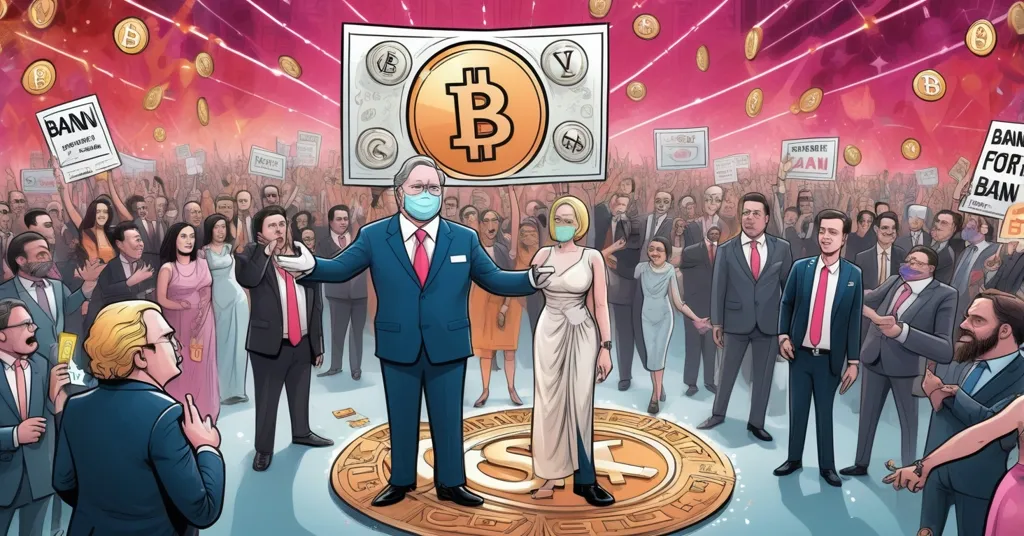Democrats Push to Ban Crypto for Politicians as Trump’s Memecoin Gala Faces Protests

Democrats Propose Crypto Ban for Politicians Amid Protests at Trump’s Memecoin Gala
Democratic lawmakers, led by Rep. Maxine Waters, have introduced the “Stop Trading, Retention, and Unfair Market Payoffs in Crypto Act of 2025” to prohibit U.S. politicians and their immediate families from owning or profiting from cryptocurrencies while in office. This legislative action coincides with increasing scrutiny over “crypto corruption” in Washington, spotlighted by former President Donald Trump’s involvement in various crypto ventures. At the same time, protests are erupting outside Trump’s gala for his memecoin, TRUMP, which critics argue could pose national security risks and foster corruption.
- Democrats propose ban on crypto for politicians
- Trump’s memecoin gala sparks controversy
- Protesters demand transparency and accountability
The proposed “Stop Trading, Retention, and Unfair Market Payoffs in Crypto Act of 2025” is a direct response to concerns about political figures leveraging cryptocurrencies for personal gain. The legislation, spearheaded by 15 House Democrats, aims to bar the president, vice president, members of Congress, and their families from owning, promoting, or profiting from digital assets during their tenure. This move reflects broader fears that the intersection of politics and crypto could lead to undue influence and corruption.
On the other side of the coin, Trump’s foray into the crypto world has been nothing short of audacious. Along with his wife Melania, Trump launched personal memecoins, while the Trump family has backed World Liberty Financial, a crypto firm issuing a stablecoin (a cryptocurrency designed to have a stable value, often pegged to a fiat currency), and engaged in Bitcoin mining operations (the process of validating transactions and adding them to the Bitcoin blockchain). Critics, including Richard Painter, a former White House ethics adviser, argue that these ventures represent a “roadmap for corruption,” raising ethical red flags.
The eye of the storm is Trump’s exclusive gala for TRUMP memecoin holders, held at his golf club in Virginia. Attendees forked out between $55,000 and nearly $38 million on tokens to secure their spot at the event. However, the gala has not been without its detractors. Senators Chris Murphy, Elizabeth Warren, Jeff Merkley, and others have voiced strong opposition, labeling the event a potential national security threat and a venue for influence peddling. The minimal vetting process at the gala, which allowed virtual strangers—including foreigners—close proximity to Trump, has fueled these concerns. Adding insult to injury, attendees were met with lukewarm hors d’oeuvres and a brief 23-minute appearance by Trump, leaving many questioning the event’s value.
Outside the gala, protests are gaining momentum. Demonstrators, including lawmakers and advocacy groups, are demanding transparency, insisting on the release of attendee names and any promised favors. They argue that the event represents a dangerous mix of money and politics, where access to influential figures can be bought and sold.
Senator Chris Murphy’s introduction of the MEME Act aims to tackle digital asset profiteering by public officials, signaling a legislative push to regulate the murky waters where politics meets cryptocurrency. Concurrently, the Securities and Exchange Commission (SEC) under Trump’s administration has reportedly eased oversight of the crypto industry, pausing investigations and prosecutions against several firms. This backdrop intensifies the debate over corruption and influence buying, especially given the significant foreign investment in Trump’s crypto projects, including from Chinese-born Justin Sun, the largest investor.
The situation is further complicated by the Justice Department’s recent memo, which criticized the Biden administration’s approach to crypto regulation and announced the closure of a national cryptocurrency enforcement team. This shift in policy underscores the challenges in regulating a sector that is both disruptive and potentially transformative.
While the proposed legislation and protests focus on the potential for corruption, it’s crucial to recognize the broader implications for the cryptocurrency landscape. Bitcoin and other cryptocurrencies promise a future of financial freedom and privacy, fostering a more decentralized and equitable financial system. However, the involvement of high-profile figures like Trump raises questions about the integrity of the political process and the potential for manipulation.
As we navigate this complex terrain, it’s essential to maintain a balanced perspective. The debate over political involvement in crypto ventures is not just about ethics; it’s about shaping the future of money and finance in an increasingly digital world. While some may see the proposed legislation as an overreach, others view it as a necessary step to safeguard democracy. Meanwhile, the protests at Trump’s gala remind us of the risks of mixing politics with cryptocurrency, particularly when personal enrichment and foreign influence are at play.
In this evolving narrative, Bitcoin maximalists might champion the purity of the original cryptocurrency, but the broader crypto ecosystem, including altcoins and other blockchain technologies, plays a vital role in pushing the boundaries of financial innovation. The challenge lies in harnessing this potential while mitigating the risks of corruption and manipulation.
Key Questions and Takeaways
- What is the purpose of the “Stop Trading, Retention, and Unfair Market Payoffs in Crypto Act of 2025”?
The purpose is to prohibit U.S. politicians and their immediate families from owning, promoting, or profiting from digital assets while in office to curb “crypto corruption.”
- How is President Trump connected to cryptocurrencies?
Trump and his family are linked to various crypto ventures, including launching personal memecoins, backing a stablecoin, and engaging in Bitcoin mining operations.
- What concerns do critics have about Trump’s memecoin gala?
Critics are concerned that the gala represents a potential national security threat and a means for corruption, with fears that it might provide foreign bidders with influence over American policies.
- What actions are being taken by protesters at Trump’s gala?
Protesters, including senators and representatives, are demanding the release of attendee names and any promised favors, highlighting the event as a risk to national security and a potential venue for corruption.
- What is the MEME Act?
The MEME Act, introduced by Senator Chris Murphy, aims to address digital asset profiteering by public officials, reflecting broader efforts to regulate the intersection of politics and cryptocurrencies.
“Trump’s crypto con is not just a scam to target investors. It’s also a dangerous backdoor for selling influence over American policies to the highest foreign bidder.” – Rep. Maxine Waters
“auctioning access to the White House and potentially violating the Constitution’s ban on foreign gifts.” – Sen. Richard Blumenthal
As we continue to debate the role of cryptocurrencies in politics, fostering critical thinking and balanced discussion remains paramount. While the potential for corruption must be addressed head-on, we cannot ignore the revolutionary promise of cryptocurrencies to reshape finance. By navigating these challenges wisely, we can ensure that the future of money is not overshadowed by the pitfalls of political corruption.



